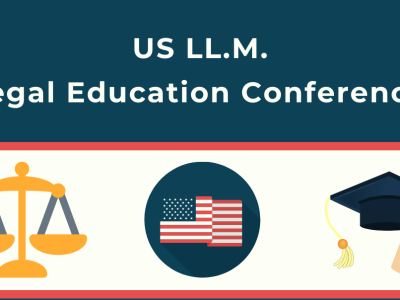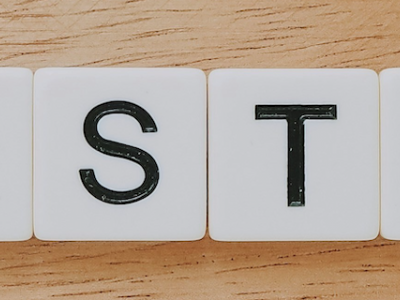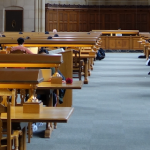One day in my life
By tmalmine in Law According to Yale on Nov 30, 2006
Just another day at the Yale Law School
Many of you have probably been pondering questions like: "what will my life in the US be like?" or "what is it like to study in an US law school?" etc. Although I cannot give definite answers to questions like that, I thought it might be useful to describe one day of my life here, to give you a glimpse of what life of an LL.M. student is like. So, let me tell you about my Wednesday, November 29th.
I woke up at 9 AM. I was supposed to have my torts class with Guido Calabresi at 8.30, but I missed it. In the beginning of the fall term, I attended all the classes very conscientiously, but now that it’s getting dark, cold, and busy, I find myself skipping classes every once in a while. I have a paper due next week, and it’s taking all my energy and time, so classes suffer. Fortunately, Yale professors don’t keep track of students’ attendance, so basically you can skip some classes if you feel like it. Calabresi is a great teacher, but torts is not really my field, so I don’t feel guilty skipping it from time to time.
At 9.45, I had my jurisprudence class. It is taught by Jules Coleman, one of the most distinguished analytic legal philosophers in the world. Actually, Coleman is the only jurisprude at YLS, and he appears to feel a bit lonely here. Yale is heavily oriented towards public-policy issues and conceptual analysis is not really fashionable. For those of you who really want to specialize in analytic jurisprudence, Oxford or NYU might be better choices. Coleman himself is a fantastic scholar and teacher, but I have come to realize that jurisprudence is not my cup of tea. I want to understand how law works in society: its sociological, cultural, and political roots, if you will. Frankly, I don't think analytic philosophy has much to contribute to that enterprise.
One of the common misunderstandings about the US legal education is its supposed rigorous, Socratic methodology. I have yet to encounter a Socratic teacher at Yale. Chicago has a reputation for emphasizing this method but it seems to be an exception nowadays. Most students I’ve talked with have a feeling that teaching here is much closer to European-style lecturing than they expected. I have nothing against that. When I’m in class with some of the best legal scholars in the world, I want to hear what they have to say; not what 1Ls or LL.M. students think. But some people are disappointed with the lack of discussion in some courses.
At 11.10., I had my legal history class. This is probably my best class so far. John Langbein has taught history of the common law for decades, and he’s one of the great authorities in the field. We are reading old statutes, cases, and contemporary scholarly writings on the subject. Materials are excellent, giving a great overview of English legal history. This is the class I would recommend to every student who comes to Yale and has even a slightest interest in legal history.
After the history class, I ran into a law teaching workshop at the faculty lounge. Yale organizes annually a law teaching series, because there are so many students here who are interested in teaching. Three YLS graduates talked about law-teaching market, job talks, and about creating research agendas. Quite interesting. Additional bonus with all these workshops is that there is usually a free lunch (contradicting the old adage). One of the best things about LL.M. programs is that great American research universities have so many interesting visitors, workshops, panels, and what have you. It takes a lot of time, but you get to see really interesting people from all over the world.
I got home at 2.15. Wednesday is usually quite a heavy day, because I have lots of classes on Mondays and Wednesdays. On other days, I have much more time to concentrate on my own research. My own experience is that you have more free time during your LL.M. year than people usually admit. Everyone keeps saying that LL.M. programs are really rigorous and you’re studying all the time and it’s really hard… I would take those horror stories with a pinch of salt. There is lots of work to do, but if you’re used to working hard (most lawyers are), LL.M. program will not be that demanding. Those who have the degree just have an incentive to exaggarate how difficult it was to obtain it.
After classes, I continued with my usual routines: went to a post office to mail a check to a utilities company, then to a grocery store, and then did some laundry and exercise at our residential building recreation center. My life outside the law school here is pretty similar to my life in Finland. I think that the US is much safer than many people think. Whatever social problems there might be, they don’t really touch me.
That was a pretty typical day of an LL.M. student, I guess. Please ask me if you have further questions about living in the US etc.
Comments
Bishweshwor Prasad Gautam, Apr 02, 2007 10:30
I am an advocate from Nepal. Now I fieled many of cases related to environment and public intrest litigation case.
tmalmine, Dec 23, 2006 13:05
Merry Christmas and happy new year to you too and to all readers!
Daniele, Dec 22, 2006 10:43
Toni, let me wish you a merry christmas and a happy new year.
If you can, let us know what Yale's first term exams where like.
regards,
Daniele
tmalmine, Nov 30, 2006 17:56
To Lit: yes, most of my fellow students feel that the program has been lighter than they expected. It's very personal, of course, and depends on the amount of your own research etc. Perhaps Yale atmosphere also makes a difference. Some courses are not graded etc. and it might make our school a bit less competitive. My opinion is that LL.M. program is easier than your first year at a law firm (or perhaps any year), but this estimate is based on hearsay and my own experience.
Yale LL.M. degree does not include a thesis as a compulsory requirement. Most students, however, do some independent research. Additionally, many courses are paper courses, i.e. they don't have any examination, but students are required to submit shorter or longer papers, in some courses every week and in others one paper at the end of the semester.
At Yale there has traditionally been a sort of division of labor in legal history. James Whitman teaches the development of Western legal tradition (including ancient history), John Langbein teaches anglo-American legal history (from the Norman conquest to the 19th century), and Robert Gordon does American legal history. Additionally, there are specialist courses: Robert Ellickson's urban legal history, Akhil Amar's and Bruce Ackerman's historically oriented ConLaw courses, research methods in legal history and so on. Legal history is quite fashionable in American law schools today, so there are plenty of opportunities to study it. You can do one course even if your main interests are more commercially and practically oriented topics.
To Huh?: would you like to elaborate a little bit. There are many visitors, who would like to hear your "critical" view on YLS. Without some further explanation your comment is pretty unhelpful.
Huh?, Nov 30, 2006 17:21
a remarkably uncritical view of Yale Law School...
Lit, Nov 30, 2006 11:47
I must say Toni, sounds surprisingly light, especially when you compare it to practice where 12 hour days of straight work are the norm. But it also sounds incredibly invigorating. When you say concentrate on your own research, do you mean for your thesis? Speaking of which, how long does it have to be (pages)? And you say you have a paper due next week, won't you explain what that means? Is it an essay on an assigned topic, does it count towards your final grade, is it a mini-thesis, all that type of stuff.
Oh and just becasue I have a personal love of Legal History, would you tell me what's discussed there? Do you deal with Roman Legal History, the ius civile, the Praetors, Justinian, that kind of stuff?? You'll forgive me, I'm a bit of a fanatic.
Your response, as always, is much appreciated.
LLM News
Virtual Event: U.S. LL.M. Legal Education Conference
Feb 19, 2024
LLM Articles
From National to Global: The Evolution of LL.M. Programs
Apr 12, 2024
As legal systems transcend borders, LL.M. programs are evolving to equip students with the skills needed for an interconnected world
Mastering Conflict: LL.M. Programs in Alternative Dispute Resolution
Feb 29, 2024
Fulfilling career paths await graduates of negotiation, dispute resolution, and arbitration LL.M. programs, where making a meaningful impact on society is paramount
Beyond Dollars: Unlocking the Full Value of an LL.M. Degree
Feb 27, 2024
The legal job market slowdown has sharpened focus on the expected payoff
Lights, Camera, Action: LL.M. Programs in Media and Entertainment Law
Feb 27, 2024
With a focus on interdisciplinary collaboration, hands-on learning, and industry-aligned instruction, these LL.M. programs draw those with a passion for both law and the arts














